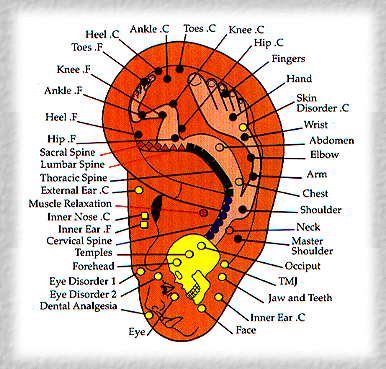|
How does Acupuncture work?
The life force (or Qi, pronounced chee) is the vital energy which keeps the body, mind and spirit alive and functioning
properly. Qi flows throughout the body, and so, the body has the innate knowledge to repair itself should any damage or disease
occur. Disease manifests when Qi becomes weakened or out of balance. The ancient masters traced the pathways Qi ...travels and located points where is communicates with the surface
of the body. Modern science has been able to measure increased electrical charge at these points, corroborating the locations
of energetic pathways or meridians. These points along the meridians are used for acupuncture and moxibustion therapy.
Does Acupuncture primarily affect the nervous system to relieve pain?
Since 1975, there has been considerable evidence that acupuncture stimulates the nervous system to release enkephalins
and endorphins, naturally occurring analgesic substances which reduce the sensation of pain. This may explain why acupuncture
can be an effective analgesic for surgery. Some researchers have attempted to establish that the material basis of acupuncture
therapy is primarily the nervous system. However, it should be understood that acupuncture needles are not intended to pierce
specific nervous tissues. It is possible that acupuncture influences the nervous system indirectly through chemical neurotransmitters
released by the body as a response to needling. At this point more research is needed to determine if there are western medical
parameters for explaining the effectiveness of acupuncture therapy.
Is Acupuncture painful?
Acupuncture does not hurt like a hypodermic needle. Hypodermic needles are very thick in comparison to acupuncture needles.
When acupuncture needles are inserted and manipulated, there is a sensation, often an electrical or tingling feeling, but
usually not pain.
How many treatments will it take before I see an improvement in my condition?
This is a difficult question to answer because it varies from person to person. Some people will be able to see an improvement
right away. With some people however, it takes as many as eight or ten treatments before a difference is seen. Every person
reacts differently to acupuncture. It also can depend on how long the problem has existed and how severe it is. |
|
|
|
|
|
|
|
|
|
|
| |
|
Is there anything I should do or not do before or after a treatment?
It is important to eat some solid food so you do not go to the treatment feeling hungry. It is also important not to be
under the influence of alcohol, excessive caffeinated liquids (coffee, tea, and soda), or a heavy meal. After a treatment,
try to avoid anything very hot or cold and avoid extreme shifts in body temperature such as steam baths, cold plunges etc.
Plan a relaxed evening. You may shower or bathe before a treatment, but don't bathe directly afterward.

What conditions may be treated with
acupuncture?
Acupuncture is a system which can influence three areas of health care:
- promotion of health and well being
- prevention of illness
- treatment of various health imbalances
While acupuncture is often associated with pain control, in the hands of a
well
trained practitioner it has a much broader application.
The World Health Organization recognizes the use of acupuncture in the treatment of a wide range of medical problems,
including:
- Digestive disorders gastritis and hyperacidity, spastic colon, constipation, diarrhea.
- Respiratory disorders: sinusitis, sore throat, bronchitis, asthma, and recurrent upper respiratory infections.
- Neurological and muscular disorders: headaches, facial tics, neck pain, rib neuritis, frozen shoulder, tennis elbow, various
forms of tendonitis, low back pain, sciatica, osteoarthritis.
- Urinary and reproductive problems.
- PMS.
- Irregular menses.
- Dysfunctional uterine bleeding.
- Painful menstruation.
Acupuncture is particularly useful in resolving physical problems related to tension, stress and emotional conditions.
Are there any side effects to the treatments?
As energy is released in the body, internal chemicals and hormones are stimulated and healing begins to take place. Occasionally
the original symptoms worsen for a few days, or other general changes in appetite sleep, bowel or urination patterns, or emotional
states may be triggered. These should not cause concern as they are simply indications that the acupuncture is starting to
work.
It is quite common with the first one or two treatments to have a sensation of deep relaxation or even mild disorientation
immediately following the treatment. These pass within a short time, and never require anything more than a bit of rest to
overcome. |
|
